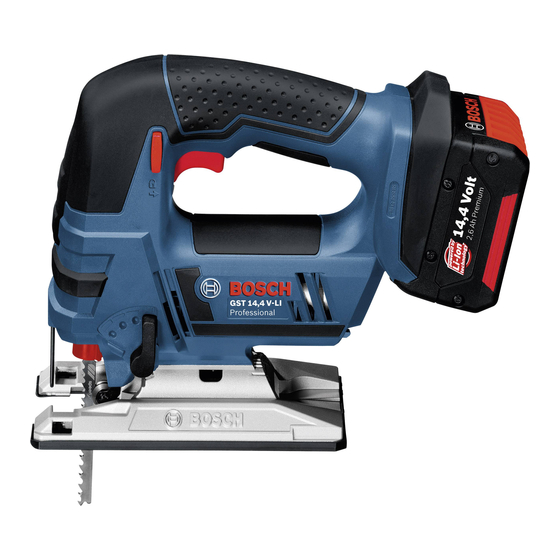OBJ_BUCH-832-004.book Page 16 Wednesday, December 12, 2012 10:31 AM
16 | English
To remove the battery 5, press the unlocking button 6 and
pull out the battery toward the front. Do not exert any force.
Changing the Tool (see figure A
Before any work on the machine itself (e. g. mainte-
nance, tool change, etc.) as well as during transport
and storage, remove the battery from the power tool.
There is danger of injury when unintentionally actuating
the On/Off switch.
Regularly clean the power tool's air vents. The motor's
fan will draw the dust inside the housing and excessive ac-
cumulation of powdered metal may cause electrical haz-
ards.
GDR 14,4 V-LI/GDR 18 V-LI/GDX 14,4 V-LI/GDX 18 V-LI:
Inserting
Pull the locking sleeve 2 forward, push the insert tool to the
stop into the tool holder 1 and release the locking sleeve 2 to
lock the insert tool.
Use only screwdriver bits with ball catch 11 (DIN 3126-E6.3).
Other screwdriver bits 13 can be used with a universal bit
holder with ball catch 12.
Removing
Pull the locking sleeve 2 forward and remove the insert tool.
GDS 14,4 V-LI/GDS 18 V-LI/GDX 14,4 V-LI/GDX 18 V-LI:
When working with an application tool, pay attention
that the application tool is connected securely on the
tool holder. When the application tool is not securely con-
nected with the tool holder, it can come off during applica-
tion.
Slide the application tool 14 onto the square drive of the tool
holder 1.
However based on the system, if the application tool 14 ap-
pears wobbly after connecting securely on the tool holder 1;
this has no influence on the function/safety.
Operation
Method of Operation
The tool holder 1 with the tool is driven by an electric motor
via a gear and impact mechanism.
The working procedure is divided into two phases:
Screwing in and tightening (impact mechanism in action).
The impact mechanism is activated as soon as the screwed
connection runs tight and thus load is put on the motor. In this
instance, the impact mechanism converts the power of the
motor to steady rotary impacts. When loosening screws or
nuts, the process is reversed.
1 609 92A 00R | (12.12.12)
Starting Operation
Inserting the battery
Use only original Bosch lithium ion batteries with the
voltage listed on the nameplate of your power tool. Us-
ing other batteries can lead to injuries and pose a fire haz-
ard.
Set the rotational direction switch 7 to the centre position to
protect the power tool against accidental starting.
Insert the charged battery 5 from the front into the base of the
power tool until the battery is securely locked.
Reversing the rotational direction (see figure D)
C)
—
The rotational direction switch 7 is used to reverse the rota-
tional direction of the machine. However, this is not possible
with the On/Off switch 8 actuated.
Right rotation: For driving in screws and tightening nuts,
press the rotational direction switch 7 through to the left
stop.
Left Rotation: For loosening and unscrewing screws and
nuts, press the rotational direction switch 7 through to the
right stop.
Switching On and Off
To start the machine, press the On/Off switch 8 and keep it
pressed.
The power light 9 lights up when the On/Off switch 8 is slightly
or completely pressed, and allows the work area to be illumi-
nated when lighting conditions are insufficient.
To switch off the machine, release the On/Off switch 8.
To save energy, only switch the power tool on when using it.
Adjusting the Speed
The speed of the switched on power tool can be variably ad-
justed, depending on how far the On/Off switch 8 is pressed.
Light pressure on the On/Off switch 8 results in a low rotation-
al speed. Further pressure on the switch results in an increase
in speed.
Working Advice
Apply the power tool to the screw/nut only when it is
switched off. Rotating tool inserts can slip off.
The torque depends on the impact duration. The maximum
achieved torque results from the sum of all individual torques
achieved through impact. The maximum torque is achieved
after an impact duration of 6–10 seconds. After this dura-
tion, the tightening torque is increased only minimally.
The impact duration is to be determined for each required
tightening torque. The actually achieved tightening torque is
always to be checked with a torque wrench.
Screw Applications with Hard, Spring-loaded or Soft Seat
When in a test, the achieved torques in an impact series are
measured and transferred into a diagram, resulting in the
curve of a torque characteristic. The height of the curve corre-
sponds with the maximum reachable torque, and the steep-
ness indicates the duration in which this is achieved.
A torque gradient depends on the following factors:
– Strength properties of the screws/nuts
Bosch Power Tools

